#roustabout job
Text
Go to rack and ruin
At the prompting of @maletfwitch, here is a sequel to an older post.
The Abbas were glad to be rid of their unpleasant neighbor. Instead, they had a hardworking and faithful new employee. Unfortunately, the house in the neighborhood did not remain empty for long. And if the Abbas had believed that the old neighbor had been a scourge of God, this one was the apocalypse made flesh. The house was decorated with American flags and MAGA posters downright grotesque. At every prayer time, the neighbor played the American national anthem over outdoor speakers. Not only for the Muslim neighbors, for all neighbors in the immediate vicinity Mr. Carson was an absolute burden. Nevertheless, he had managed to organize a neighborhood watch and become the head of it himself. Needless to say, he preferred to position people in front of the Abbas' property and made no secret of the fact that they were the threat to security and order. Fortunately, the Abbas knew how to help themselves again this time.
When Mr. Carson awoke the next morning, he was not wearing freshly laundered pajamas. Instead, he was wearing a sweaty wifebeater and a pair of worn-out underpants that might have been white at some point. Bleary-eyed, he went to the refrigerator and grabbed a cold Bud light. Fuck, where had he put his chewing tobacco? The kitchen was a mess again. Peter Carson filled a garbage bag with beer bottles, the contents of various ashtrays, and the pizza boxes from the last few days. He went outside, tossed the garbage bag to the others in the front yard. The last ones had been tampered with by those darn rats or raccoons. Miserable vermin. Like the filthy terrorists next door. Still in his underwear, Peter raised the American flag, saluted, took a swig of beer and belched. Old Mrs. Price across the street turned away in disgust and pushed her walker a little faster.
Peter went back into the house. So slowly he had to get to work. His hardware store was opening soon. After a quick shower and a rather sloppy shave, Peter, in his lumberjack shirt, not-so-clean jeans and old work boots, left the house and got into his swank Mercedes. Did not really fit him and also not to his job. He could not even remember when and why he had bought this car. But it was a good car and it had been built by good people. Not by those dirty gooks. In his store, he also only sold things that were built in America. America first!
When he returned home after a long day at work, he cursed his old car. Yes, 30 years ago the Mercedes had certainly been a good car. But the repairs would have been expensive, now neither the air conditioning nor the right turn signal worked. The Teutonic steel was slowly turning into a rolling pile of scrap metal. Oh well, Pete thought to himself as he pulled into the cluttered driveway. Fits the house with the rotten porch and broken fly screens. Pete sat down on the porch with a not-very-cold beer from the decrepit refrigerator, picked up his air rifle and shot at the possums rummaging through his trash.
As they did every night, the police came. The stuffy neighbors would have complained about him again. Pete slurred that the cops should fuck off. The cops fucked off and took him to the drunk tank.

Fuck, if he was late for work again today, he'd lose his roustabout job at the sawmill, too. Just like he had already lost the house and his store. But he loved his life in the trailer park. All good American men here. Always someone around who had a cold beer or a can of chewing tobacco. Just the damn rats! Pete took his rifle and tried to take out some of the beasts. Hehehehe, four had to go down. A swig of beer on top of that. And then off to work in his German sweetheart, which he had tuned so impressively himself.
78 notes
·
View notes
Photo


Tavern: The Long Walk off the Short Pier
“ ‘onestly tried a bunch of names ‘afore this one stuck, The Pelican, Drowned Admiral, but the Long Walk was great for two reasons. First is makes directions simple, Every sailor, roustabout, merchant and doxie knows where the Short Pier is, right next to the Long Pier. Second is clientele, when we started out I didn’t want anyone in my establishment who can’t take an insult when asking where they should eat, first on account of my face, and second because of my cooking.
Which reminds me, what’ll yall be havin?”
Situated in the heart of a thriving trade port, The Long Walk is exactly the sort of tavern that becomes a mainstay of adventurers: Rough enough that they don’t mind cursing, brawling, or an errant cantrip going off, but not so rough that the party needs to check their beds for lice or worry about getting knifed when they visit the privy. This precarious balance of chaos is the lifelong achievement of one Berner Bask, who operates the tavern in memory of his departed mother, herself a tavernkeep, who was left destitute after her establishment burned down.
Adventure Hooks:
Berner is the person to know if you need to find work, as after the fire he grew up hauling cargo and rubbing elbows with the high and low of the harbour's trader and labour classes. If a merchant’s hiring on guards for her wagons, Berner can make introductions. If there’s strange happenings up the coast, Berner knows about it and has an opinion. If there’s a shipment late that needs checking on, Berner knows who’ll pay to find out why. Having lost nearly everything early on, Bask knows how a steady job can change a life, and how coin in hand translates to drink in the other and food in the belly.
By the grace of gods of land and tide, the Long Walk finally has a good cook, sparing regulars and newcomers alike from the travesties that Bask routinely creates in the kitchen. A timid halfelven woman by the name of Prim, the party are likely to enjoy quite a few of her delicious meals before she disappears, leaving them and the other patrons of the tavern with many questions and greyish mush on their plate. As it turns out, Prim was working under an alias, having fled her previous job as a lord’s personal chef when that lord dropped dead from poison. Wanted by the authorities, Prim had fled to the port hoping to hide among the hustle and bustle and hop a ship if she was ever discovered. Depending on how fast the party solve the mystery, the party can either give up Prim to the authorities (she did totally slip that guy poison, she was paid poorly and rival nobles pay well), help her cover her trail and return to her life, or lose her completely and end up running into her in some other port in their far later adventures.
246 notes
·
View notes
Text
Roustabout Review
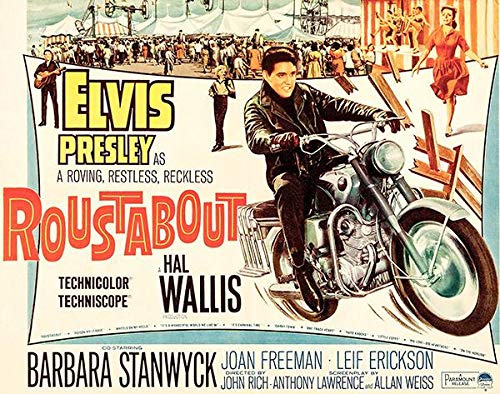
Marred by pre-production issues, Roustabout took about 3 years to put out. Announced in 1961, Elvis didn't start filming until March 1964 at 29 years old (well after he stopped playing bad boy characters). This film also had Colonel's influence as he wanted the film to be portray carnival life as a respectable profession.
Made after VLV and Kissin Cousins, this is the last film from Elvis' 2nd Hollywood phase (lighthearted musical comedy travelogues). Does Roustabout have enough of a gritty yet colorful edge to make it enjoyably different, or was it trying too hard to capture a movement and emotion that was no longer relevant? Let's find out.
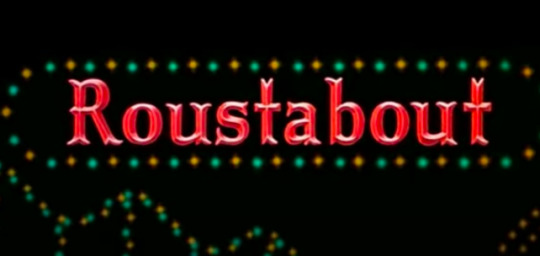
The titular song "Roustabout" gets us off to a great start. The colored lights are tolerable for those who are photosensitive. The song itself is very enjoyable but I'm not sure if it fits the movie's characterization of Charlie. He's characterized as a ruffian with a chip on his shoulder. I personally recommend looking up "I'm A Roustabout", an alternate opening title song that I think better suited Charlie's character.
So we get introduced to some college kids that only show up for this one scene and I don't like their attitudes. They get all uppity with a waitress who insists on giving them non-alcoholic drinks despite one of them claiming they're all 18 (unless this takes place in Louisiana, states even back in 1964 had the purchase age at 21 to buy alcohol so that argument is moot). The establishment has the right to enforce underage drinking laws, so regardless of their actual age, the waitress has to at least check.
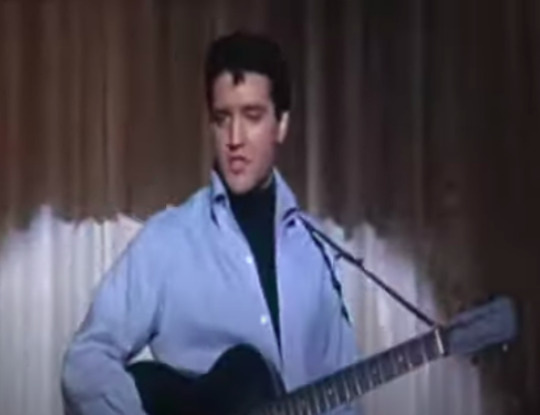
This is the first example of the movie telling us to think one way about Charlie despite showing evidence suggesting otherwise. The college students start heckling him and then get mad when he heckles back. "Poison Ivy League" is an entertaining song that calls out the rich college students and has a unique sound for an Elvis song.
When the song is over, we're made to believe that Charlie is some type of bad boy who picks fights because he's got a chip on his shoulder for being an orphan. That isn't the case at all because Charlie didn't start the fight. Him being an orphan has absolutely nothing to do with this interaction. The college boys started it by making remarks and if you look closely, the one in the blue actually started to swing first. Despite this, Charlie is the only one who gets arrested then gets slapped by the waitress who bailed him out. She's upset that he wouldn't take her with him, when in reality he's not obligated to do anything more than pay her back.
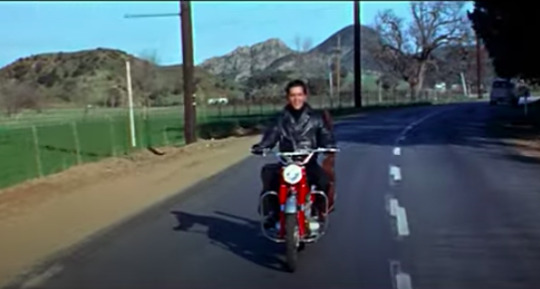
"Wheels On My Heels" is a good song that properly fills in what otherwise would've been dead air. You want to believe that Charlie is content with being on his own as he travels to his next job. However, given the circumstances that lead to this, you still don't get the idea that he's a bad boy. He's acting like a relatively reasonable person that doesn't like getting blamed for things he didn't do.
Which is what makes Joe running off the road so frustrating. Charlie flirts with his daughter, Cathy, and he just completely loses his mind. He verbally stated his intents on killing Charlie, yet still makes it like it was Charlie's fault. What's worse is that, Charlie is forced to work with Maggie and the family until his motorcycle is fixed. Instead of offering to buy him a new bike all together, this family makes like Charlie should be honored to work there as opposed to being held against his will.
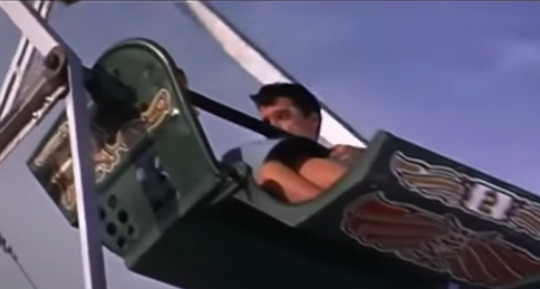
We get a walk through of the carnival and I immediately get the idea that Colonel contributed to the script. Cathy uses all this carny talk and then compares it to doctors using Latin because it separates them from the common man. I'm all for wanting to break stereotypes, but Cathy saying this makes her come off as nothing but high in mighty. At least with Cody and the other carnival workers, they have a realistic perspective of trying to take pride in their work despite their low status. It's just a shame none of them show up again to do literally anything. Charlie so far is quite personable and even tries to be nice to Cathy by going on a Ferris Wheel ride singing "It's a Wonderful World." It's a beautiful song with unique tracking shots of the Ferris Wheel moving.
Joe is still unreasonably awful when he's not even the boss. He would literally rather pick on Charlie than accept his half dollar coin for using a ride. We later find out that Maggie is also an irresponsible carnival owner for keeping him employed there. Joe as we learn, was drunk on the job and rigged a ride that ended up killing someone. As a result of not having insurance, Maggie now owes the bank compensation. Instead of doing literally anything, she still insists on keeping Joe employed and only blames herself for letting the insurance lapse. In reality, she'd likely be forced to shut down her business and Joe would definitely be out of a job. There's no way she'd be in business if she kept Joe working there as she'd be complacent in his negligence.
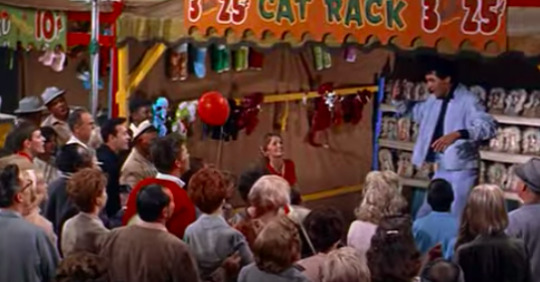
It's the first night of the carnival and while there is business, Cathy simply isn't doing enough to get money at her booth. So what does the bad boy Charlie do? He sings "It's Carnival Time" to attract business on a toy ukelele. Wow that's such a bad boy move /s. Charlie was so bad that he actually manages to earn the carnival a lot of money for that game.
The song itself is still good but I don't think it was lip-synched well. In the shots like this one, Elvis sometimes isn't even moving his lips while he's singing. But ultimately I still buy the idea of using him to attract customers since his songs are entertaining. If only the movie also properly utilized the Wall of Death since we know Charlie is a motorcycle rider.
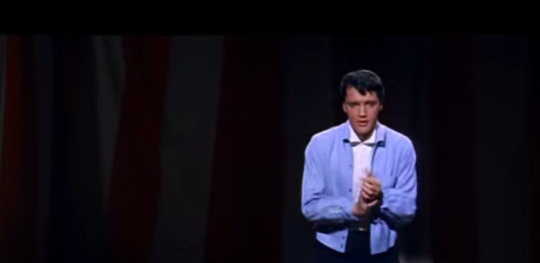
We get a double header of "Carny Town" and "Hard Knocks" which both do a good job of entertaining the crowd. In the meantime, we get an introduction to the so called "villain" of the movie. Harry Carver is meant to be this no good carnival owner that buys out dying businesses. However, given what we know so far about Maggie and co. I don't hate this man at all. Maggie has shown that she's unwilling to get rid of Joe despite him actively being cruel to other workers, while Harry Carver actually comes off as a reasonable man who just wants to provide the highest quality entertainment possible.
When Charlie's show ends up being a success, Joe still can't even have the guts and admit that he was wrong. He still thinks Charlie is the bad guy here. So of course when Charlie is still salty about the damages Joe caused, Cathy is mad at him for being ungrateful when Maggie gave him a new guitar. Do you see how messed up that is for Cathy to not only defend her father's awful actions, but then have the gall to get mad at Charlie like he's the heel? I'm sorry but the movie is actively trying to gaslight its audience into think Charlie's this bad boy when in reality Charlie's the victim. I just can't support this downright unreasonable and unlikeable family.
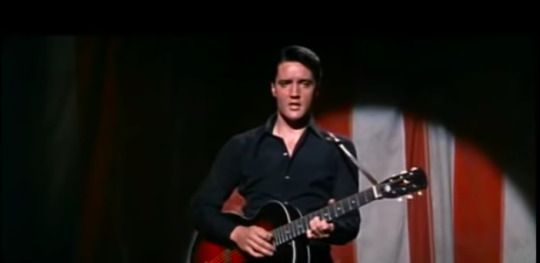
At Charlie's next show we get "One Track Heart" and it's one of the best songs in the movie for how entertaining it is. That being said, I have no idea why Charlie changes his mind out of nowhere when he signs Maggie's contract. Nothing we've seen indicates any major change in his status there. This is where not giving his relationship with the other male carnies any development, really hurts the movie. It just feels like the script is forcing Charlie into this instead of naturally establishing reasons to make him change his mind. That's bad storytelling where you're telling us this is what needs to happen as opposed to showing us how Charlie grows.
Cathy also comes off as being super unlikeable by getting mad at Charlie for so much as being with Estelle, the fortune teller. They are not dating and she didn't even tell Charlie how she felt. Charlie is not at all obligated to stay loyal to her. She just comes off as high and mighty like Charlie should never dare have affections for another woman and it's very annoying. I just don't get any chemistry from these two at all and it's another aspect of the story that just feels forced.
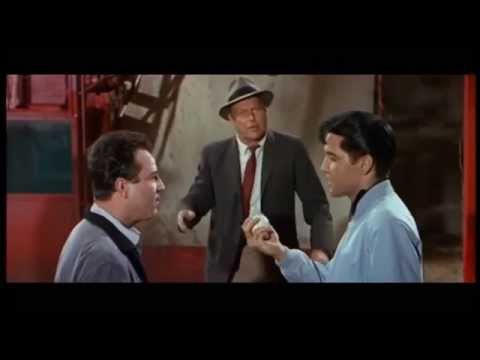
After signing the contract with Maggie, Cathy is seen running the dunk tank with Joe and my god do we get the most obnoxious couple I've ever seen in my life. This couple actually makes me feel bad for Joe when they accuse him of stealing their wallet when they have been nothing but a nuisance and started a fight with Charlie. Then again, this family gets mad at Charlie having dared feel concern over Cathy's wellbeing. I was so mad at Cathy when she slapped Charlie because I have no idea why I'm supposed to get at someone who just wants to help. How I'm supposed to like anyone in this family over Harry Carver when they've all treated Charlie as nothing but dirt?
Estelle the fortune teller and Cathy are just awful love interests. They wanna make like they're interested in Charlie, but just when Charlie shows interest back, they get all disgusted. That's not a bad boy. A bad boy wouldn't listen to Cathy when she says she's not a one night stand type of girl. Like Estelle gets mad at Charlie even though she was the one who wanted him to have sex with her. It comes off as these women being so flakey and unlikeable as opposed to Charlie actually being wrong for pushing.
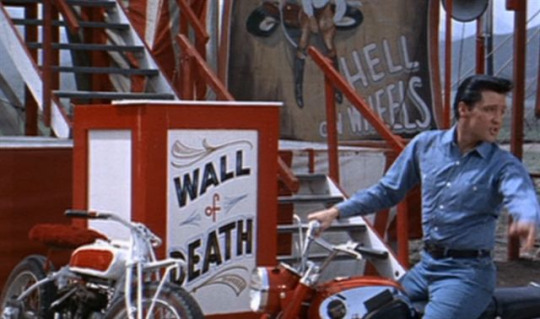
So he finds the wallet and like a good friend decides that Joe needs time to get sober. The next morning, he gets his bike back and is about to leave when he sees the Wall of Death. In a scene that absolutely serves no purpose outside of wasting time before the big reveal, Charlie tries his hand at it. Once he had his fun, Charlie tells Maggie and the other carnies that he found the man's wallet last night. As rational, reasonable people, every single person gets mad at Charlie for betraying Joe. They think Charlie was a heel for having dared think it was a good idea to keep a drunk man in jail longer than he should've been.
I just can't stand any of these people. Charlie actively tries to keep an absolutely terrible person in jail just long enough to sober up and HE'S THE BAD GUY! I think everyone in this carnival is insane. The colonel wanting to make this a specially coded business with rules ended up making this a straight up cult. If you don't drink the kool aid and support your fellow carny no matter how much of a horrible person they are, you're the bad person. I want this carnival to fail and go out of business because of how awful they are. That's a complete failure on the writers part to just completely fumble the ball when making Charlie this "bad boy" who has to change his ways. I want Charlie to get as far away as possible from these people.
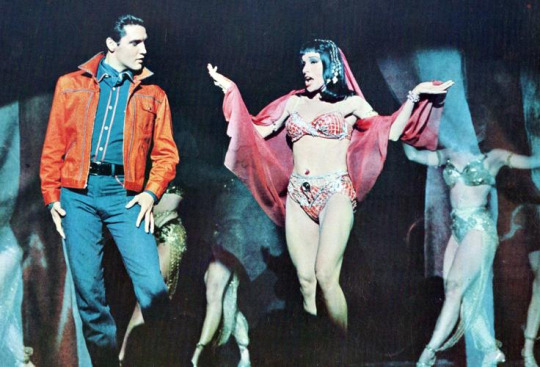
Charlie of course signs with Harry Carver and I refuse to believe he's supposed to be the bad guy like the movie wants to make him. He's an actually reasonable man who runs a far superior business. This is a whole theater with numerous performers providing a quality show. However, "Little Egypt" is by far the weakest song in the movie. I hate the sound effect used as it hurts my ears and is completely unnecessary. It ruined what would've otherwise been an absolute banger and a good reason to believe that Charlie is a good performer.
We see Maggie's carnival and of course it's failing. It's almost like they didn't realizing casting Charlie out would have consequences. Cathy and Estelle talk and despite literally watching her kiss Charlie multiple times, Estelle says "she didn't even get to first base". I have never seen a movie completely mess up on its own continuity this badly. It gives you this feeling of anxiety that you're being gaslight as the movie tells you one thing despite being shown something completely different. We never once see Charlie use anyone like Estelle says he did and it's completely ridiculous.
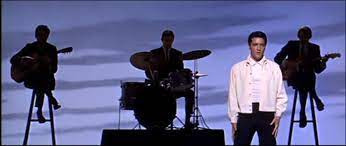
I love "Big Love, Big Heartache". It's the quintessential Elvis ballad but if Charlie had an actual character arc this is the perfect way to show that he actually does love Cathy. It's such a shame that he doesn't have any character arc at all. Cathy just shows up because she wants to manipulate Charlie into coming back and he does. I think Charlie is absolutely insane for leaving a legitimately superior job for an actually toxic work environment. Based on what we're shown, no one at Maggie's carnival is likable enough to make Charlie want to be there.
I honestly feel bad for Harry Carver because he's a reasonable man who actually cares about his business. He even cares about Charlie being in love with Cathy and tries to give him advice. Charlie just gives him the shaft because we're near the end and this has to have a "happy" ending where Maggie's carnival is saved.
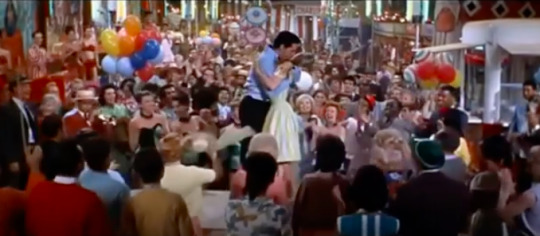
This is the most forced ending I've ever seen in an Elvis movie. Absolutely nothing is earned here. Absolutely nothing in this movie was properly developed as we're introduced to things like Charlie being an orphan and the wall of death only to have neither of those things matter. It's not like Loving You where Deke being an orphan actually matters as he learns how to heal and accept that he's good enough to have friends. With the Morgans you can't help but think this is the most unlikeable family you've ever seen. It's so badly written that the only way you can make sense of it, is to come up with the conspiracy theory that Joe is abusive towards both of them. It would other wise make zero sense for Maggie or Cathy to defend Joe.
Charlie can't accept the Morgans as his family because despite "There's A Brand New Day On The Horizon" telling us things are going to get better, I just don't think it will. Joe didn't have his epiphany and realizes Charlie is a good guy. Joe only accepts Charlie coming back because it's the end of the movie and the script tells you that he does. It's all so forced and I have no reason to believe Joe will get better. A complete mess of a story that is absolutely frustrating to watch.
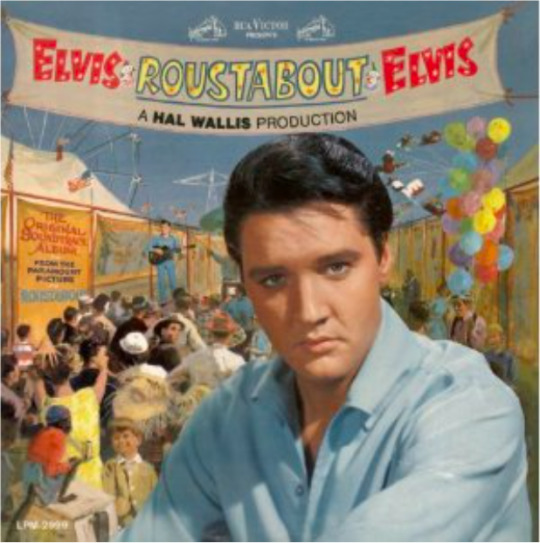
I said in my Clambake review that it was the hardest film to develop a solid opinion on whether I liked it or not. Roustabout to me is like a Clambake but in reverse. Clambake had bad production and some bad songs but had the best character writing I've seen in a mid 60s Elvis movie so far. Roustabout meanwhile had good production and an amazing soundtrack (outside of the sound effect used in Little Egypt.) but the worst character writing I've ever seen in an Elvis movie.
Since the writing is the worst part of the movie that singlehandedly ruined my ability to enjoy it, I have to give it 5/10. This movie's production and soundtrack just wasn't enough overcome the failures of basic story telling. I personally didn't vibe with it so I can't say I'd recommend it but if you're someone who only watches Elvis films for the songs or doesn't care as much about the writing, then I think you would have a great time.
------------------------------------------------------------------------------
AN: Thank you @xanatenshi for requesting this review as well as @thedaisymaisy for providing input about the film. If anyone wants to send a request, feel free to send it in.
Tagging: @lynettethemadscientist, @motht-eeth, @ash-omalley, @spooky-hazex, @teamnefarious, @blighted-star, @ab4eva, @oh-my-front-door, @father-of-2cats, @stormie-ryan23, @yksuwyksud, @tacozebra051, @alienelvisobsession, @vintageoldsoul, @ohmygiddd, @lovininapinkcadillac, @stephthestallion, @mistyspresley, @bisexualwvtson, @ahundredlifetime, @karel-in-wonderland, @elvispresleywife, @georgefairbrother, @moonchild-daniella, @musiclover712, @worldofyns, @sillybookmarks, @g00d2balive, @leighpc, @generoustreemystic, @peskybedtime, @thetaoofzoe, @renegadewarrior, @vintagepresley, @tupelomiss, @myradiaz, @pinkcaddyconfessions, @kiankiwi, @presley72elvis, @delulubutidontcare, @januarypresley1969, @livelaughelvis, @all-hookedup-on-elvis, @slayingjd, @ilivebecauseiamforced, @dusintv, @cattcb, @jaqueline19997, @richardslady121, @iloveelvis2, @lett-them-eatt-cake @if-i-can-dream-of-elvis and @lookingforrainbows.
22 notes
·
View notes
Photo


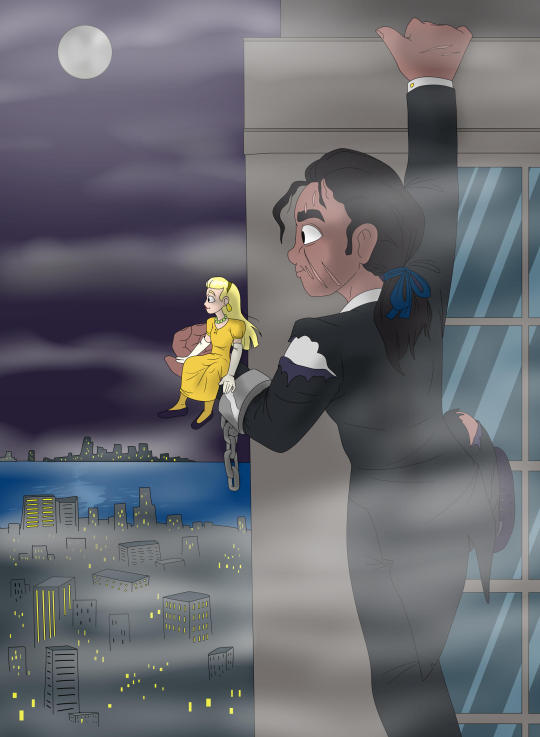



I’ll just go ahead and leave all this here and see what y’all think of it.
“KID KONG, The BOY WONDER of the WORLD”
ACT ONE
Our story begins, like many Kong stories before, in New York. A failing director, Earl Dunham, has travelled here as he’s been given one final chance to make a profit and pay back the studio he works for on all the money lost from his last three motion pictures: “Jungle Love”, “Going Ape” and “Deadly Seas”. As he struggles to find an actress willing to participate in the film for cheap, he meets a little girl, Lily, who gets caught stealing an apple. He pays for it. She’s thankful. Later the girl’s mother, Diane Sparrow shows up and thanks him for his kindness. He offers them dinner and asks her if she’d be interested in starring in his film. Seeing an opportunity to become wealthy, she agrees. Through Lily’s internal thoughts, we learn this hasn’t been the first time she and her mother have pulled this stunt. It being something Lily is highly against, but must obey her mother regardless and if they want to not starve or freeze. At the docks we meet a boy named Shawn. Him working as a roustabout as he is the oldest and his mother is unable to get a job as she needs to care for her two other youngest children. On their way to the filming location, Diane continually tries to woo an oblivious Dunham. She is unsuccessful everytime much to her annoyance. Her daughter however is more successful in this regard as she and Shawn start to fall for each other. Puppy love if you will. The crew begin to stir with uneasiness as to where they’re going and demand an answer. Dunham gives in and tells them that the filming location is set on an island dubbed “Happy Island”. It was named so for it resembling a smiling clown when looking at the island from a high altitude. However, the name is meant to be ironic as Dunham doesn’t tell the crew that the island is said to be infested with the most dangerous and terrifying creatures on earth. They eventually do arrive on the island. Once they start getting ready to shoot, Lily is neatly kidnaped by the island natives to be used as an offering to their god: Kid Kong. She is swiftly rescued and they retreat to the ship. Dunham disappointed that he once again is left empty handed. Before they can leave the island, Lily is taken and is given to their god. Kid Kong takes her into the jungle. Dunham, Ms. Sparrow, Shawn and the rest of the crew set out to save her.
ACT TWO
- Lily makes an attempt to escape but is caught by Kid Kong
- A multi-horned rhino attacks the crew
- Kid Kong fights a Woolly Mammoth
- A family of sauropods stampede after getting spooked by a sneeze
- They encounter a Spinosaurus in a swamp, along w/ a Plesiosaur and other various monster fish
- Lily tries to escape once more, but keeps running into dangerous situations: leading to Kid Kong fighting a large carnivorous theropod
- A giant pelican-like bird attacks the rescuer’s camp
- Lily and Kid Kong start getting to know one another and build a bond (Lily does most of the talking, but through Kong’s gestures we get a sense of what his past was like)
- Kid Kong (w/ Lily) runs into the rescue team and they open fire on him. Believing them to be also a danger to Lily he flees. Running across a log bridge, causing it to dislodge as he does. By the time the crew make it halfway it starts to slip and only Shawn makes it across to the other side. The rest make it back to the side they started on as the log bridge falls into the deep pit below
- Lily is rescued by Shawn and they flee
- Kid Kong is lured down to the beach and gets knocked out with a boulder that was dislodged by a gas bomb Kid Kong had ducked under when it was tossed at him
- In an effort to salvage the mess, Dunham takes Kid Kong to New York
ACT THREE
In a few months, Kid Kong is finally shown off to the public who are both amazed and stunned by the sight of the gargantuan human. Kid, now dressed up in oversized modern clothing (a suit) to appear more civilized, feels indifferent as long as Lily is okay. More of a background detail, but in the public's eye, Dunham, Diane and Lily are a sort of family (something Diane is heavily pushing for which Dunham is rather oblivious to). As the show goes on, several photographers start taking pictures. Diane is soaking all the attention up like a sponge and as she tries to pull Lily in closer to pose for the photos, in the struggle this starts to upset Kid Kong as he believes her to be attacking Lily. Lily tries to tell her mother this but is ignored. He breaks his chains holding him much to everyone’s horror. Diane, Dunham and (much to her objection) Lily, split the scene w/ Kong close behind. Outside, Dunham flags down a cab to get out of there. They make an escape just as Kid makes it outside and goes the opposite direction. Shawn meanwhile as he leaves for the night to return to the docks sees the army moving in. Realizing what’s happening, he goes to find Lily and Kong. Kid Kong starts looking through New York for Lily causing hundreds of dollars worth of collateral damage in the process on accident in his confusion of the new environment. At this time Lily has managed to wriggle out from her mother’s grip and goes off to find Kid before any more bad things happen. Soon enough they find each other and go on a search for safety. Shawn is close behind on their tail. Lily suggests he go up the Empire State Building; a spot she hopes the army/military won’t be able to reach him and they’ll be left alone. As Kid Kong reaches the top to enjoy some peace and quiet with Lily, several biplanes show up and start firing at him. Shawn makes it to the building and begins to head up to the top himself. Kid Kong does his best to fight the planes only managing to take out three (one being w/ his shoe he threw). Eventually he finds himself on the verge of death’s grasp as his wounds begin to take their toll on him. In one last attempt to take out one of the planes, he loses his strength midway and falls to his death. As people start crowding his lifeless body, Lily is heartbroken by the tragic death of her friend. She is comforted by Shawn. Diane and Dunham soon arrive at the scene having gone after Lily once she ran off. Dunham overhears talk of how the airplanes got him and in response, Dunham says: “No, it wasn’t the airplanes. It was beauty’s friendship that killed the beast...” Dunham leaves both Diane and the scene as it draws to a close...
THE END
Other illustrations of the story I’ve made over the last few years:
https://www.deviantart.com/artmakerprod ... -794090860
https://www.deviantart.com/artmakerprod ... -794490741
https://www.deviantart.com/artmakerprod ... -794339273
https://www.deviantart.com/artmakerprod ... -796983529
https://www.deviantart.com/artmakerprod ... -790065846
https://www.deviantart.com/artmakerprod ... -789939706
https://www.deviantart.com/artmakerprod ... -878132519
https://www.deviantart.com/artmakerprod ... -795482902
https://www.deviantart.com/artmakerprod ... -848061140
https://www.deviantart.com/artmakerprod ... -805828855
https://www.deviantart.com/artmakerprod ... -871829971
https://www.deviantart.com/artmakerprod ... -870184922
Will probably refine the story beats more in the future.
#king kong#parody#spoof#kong#digital art#digital#drawing#art#giant monster#dinosaurs#giant#giant human#Kid Kong
22 notes
·
View notes
Text
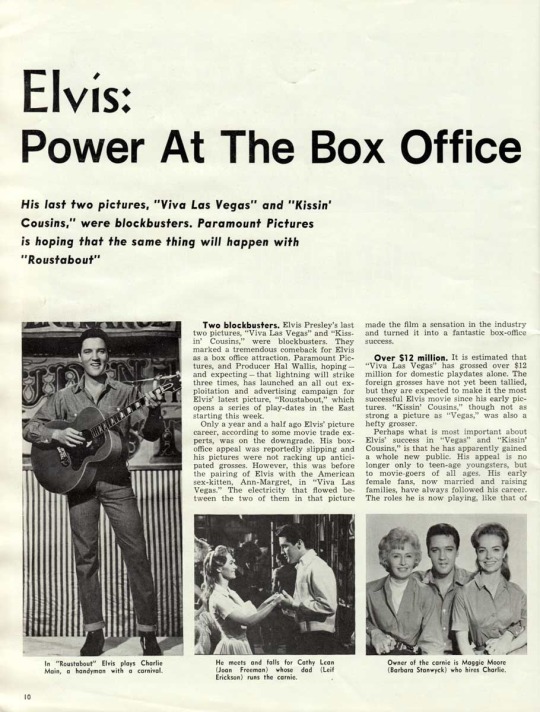
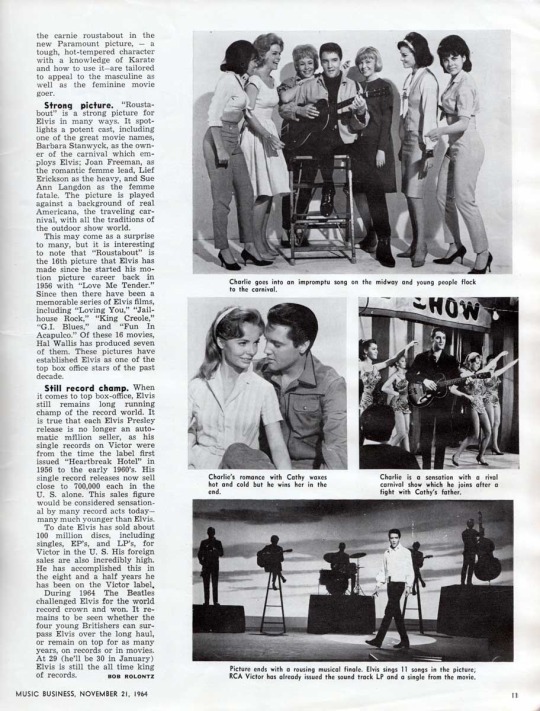
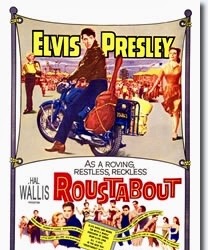


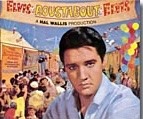
Elvis Presley Events In History Today The 21st November in 1964 Is Sixteenth Movie Was Premiered In Hollywood. Roustabout By Paramount.
Elvis Presley’s sixteenth movie was the 1964 Paramount film 'Roustabout'.
Playing opposite Barbara Stanwyck this time out in Roustabout, Elvis Presley was in awe of his costar and worked hard to live up to her professional standards. Unfortunately, the scriptwriters were less demanding of themselves, and the film suffers from banal dialogue and predictable plotting. Elvis Presley starred as Charlie Rogers, a drifter with a chip on his shoulder who lands a job as a roustabout, or handyman, with a down-and-out carnival operated by strong-willed Maggie Morgan, played by Stanwyck. When Charlie breaks into song on the midway one day, throngs of young people flock to hear him sing. As news of his talent spreads, Maggie's carnival begins to turn a tidy profit. Charlie's good fortune continues as Cathy, a beautiful young carnival worker played by Joan Freeman, takes a romantic interest in him. However, after a misunderstanding involving a customer's missing wallet, Maggie and Cathy chide Charlie for his selfish attitudes. The embittered young man quits Maggie's outfit to work for a rival carnival. When Maggie's carnival starts to go under, Charlie returns with enough money to ward off the creditors. His unselfish act wins Maggie's respect as well as Cathy's heart. Having at one time been a carnival worker, the idea for a picture with a carnival background had been that of Colonel Tom Parker, Elvis Presley’s manager. However, Colonel was adamant that the movie 'not cheapen carnival life....that this was a wholesome way of life in which the participants had a legitimate pride'.
The movie was first announced in May of 1961, but production was delayed until March of 1964. In the time between there were changes. Among them were: that the working title went from 'Right This Way Folks' to 'Roustabout'; that Elvis Presley’s character name changed from Charlie Main to Charlie Rogers; and that the character of carnival owner Maggie Moore changed to Maggie Morgan; and that the actress chosen to play Morgan changed from Mae West to Barbara Stanwyck. The writers were Anthony Lawrence and Allan Weiss.
Anthony Lawrence later worked on the scripts for the Elvis movies 'Paradise Hawaiian Style' and 'Easy Come, Easy Go' and the 1979 TV biopic 'Elvis', starring Kurt Russell in the title role. Among his other credits are a number of TV series including 'The Fugitive', 'Hawaii Five-O', 'Cannon', 'Quincy' and 'The Blue Knight'.
Allan Weiss was the screenwriter for the Elvis Presley’s flims 'Blue Hawaii', 'Girls! Girls! Girls!', 'Fun In Acapulco', 'Paradise Hawaiian Style' and 'Easy Come, Easy Go'. He once remarked that the scripts were written to producer Hal Wallis's specifications: 'Wallis kept the screenplays shallow'.
'I was asked to create a believable framework for twelve songs and lots of girls'. However true this was, both Mr. Lawrence and Mr. Weiss received a nomination from the Writers Guild of America in 1965 for their work on 'Roustabout' as the Best Written American Musical of 1964.
The director was John Rich and this was his first time to work with Elvis Presley He came from a strong background in TV, having directed such series as 'Our Miss Brooks', 'I Married Joan', 'Gunsmoke', 'The Rifleman', 'The Andy Griffith Show', 'The Dick Van Dyke Show' and 'Gilligan's Island'. He was anxious to break into film directing with Hal Wallis. He wasn't impressed with Elvis Presley’s Memphis Mafia entourage and their constant hanging around and playing practical jokes on one another. Elvis Presley told Mr. Rich, '...when these damn movies cease to be fun, I'll stop doing them. And if my guys go, (expletive), so do I'. Elvis Presley and Mr. Rich had gotten off to a shaky start when Elvis Presley cajoled the director into allowing him to do his own stunt fight, which was very uncommon then due to the possibility of the star's being hurt and shutting down production. When Elvis Presley indeed was hurt in the stunt and required several stitches above his eye, Mr. Rich was afraid to tell Hal Wallis that he'd allowed their star to become injured. Then he came up with a plan to write into the script the bandage that covered the stitches and thus production wasn't halted and Wallis was appeased. John Rich later directed Elvis in 'Easy Come, Easy Go'. By that time he was disillusioned with Hal Wallis and his methods and had developed a respect for Elvis Presley And No Big Star Had Ever Put Him Straight Like He Did When He Told If These Damn Movies Cease To Be Fun I’ll Stop Doing Them. He Really Admired And Respected Elvis Presley For Standing Up And Speaking Is Mind Although Parker Wasn’t Happy As He Pulled Elvis Presley Up Rich returned to directing TV series including such programs as 'All In The Family', 'Sanford and Son', 'Maude', 'The Jeffersons', 'Barney Miller', 'Newhart', 'Dear John' and 'Murphy Brown' among others. He has received many accolades including seven Emmy nominations with three Emmy wins.
On February 26, 1964, Elvis Presley reported to Paramount for pre-production. He started with soundtrack recording sessions at Radio Recorders of Hollywood. On March 3, Elvis Presley recorded the version of the title song 'Roustabout' that was written by Otis Blackwell and Winfield Scott. It was not used in the film. Instead they used a different song with the same title written by Bill Giant, Bernie Baum and Florence Kaye.
Elvis Presley recorded his vocals for that second song on April 29, 1964 after the principal photography was shot. An acetate of Elvis Presley’s long-thought-lost Blackwell/Scott song was found in Winfield Scott's basement and RCA first released it as a bonus track on the 2003 Elvis 2nd To None album. To differentiate it from the one used in the movie, the title was changed to 'I'm a Roustabout'.
Elvis Presley became frustrated during these sessions when he wanted The Jordanaires to back him up on a song that he would be seen singing alone in the film while riding a motorcycle down the road.
One of the producers questioned him as to where the backup singers would be in the shot.
Elvis Presley snapped back, 'The same damn place as the band!'
One of the songs in the film, 'It's A Wonderful World', written by Sid Tepper and Roy C. Bennett, was for a time in contention for an Academy Award nomination as Best Song.
For authenticity in Elvis Presley’s sixteenth film, 'Roustabout', a real carnival was employed and set up on land near Thousand Oaks, California. This was one of the locations used for exterior shots in the movie. The interior shots used three connecting sound stages (Nos. 12, 14 and 15) on the Paramount lot. The doors between them were opened up to make them into one huge stage, which was needed to accommodate the set for the big tent scenes. This was the first time in the history of the studio that they had done this.
13 notes
·
View notes
Text
Voyage Through the Disney Canon :1937-1949 ranking
These are the first 11 Disney animated films ,ranked from my least favorite to most favorite
11.Fun and Fancy Free -Ah Fun and Fancy Free,the favorite Disney film of nobody ,at least from what I have seen .I have never seen any one talk about this one positively and yeah I'm not gonna praise it either,this film is rather messy .I really dont like the first segment about Bongo the Bear,I actually think it is dreadful (THough Dinah Shore does some good narration ),Jiminey Cricket is a bit grating here ,and I like Edgar Bergen in general but wow is the wraparound segment with him unsettling especially if you dont know who he is .The Mickey and the Beanstalk segment is good but not to noteworthy aside from Bill Gilbert delivering a enjoyable performance as the giant and there is a scene where Donald becomes murderously insane ,thats fun
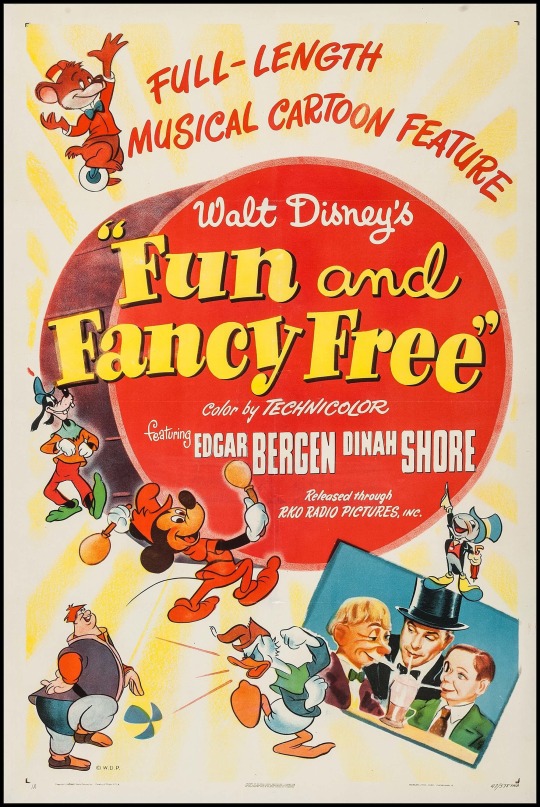
10.Saludos Amigos -This movie isnt bad,its just....Barely a film .Its only a bit over 40 minutes ,it feels more like EDutainment talking about South America .It fine for what it is and hey it gave us Jose Carioca
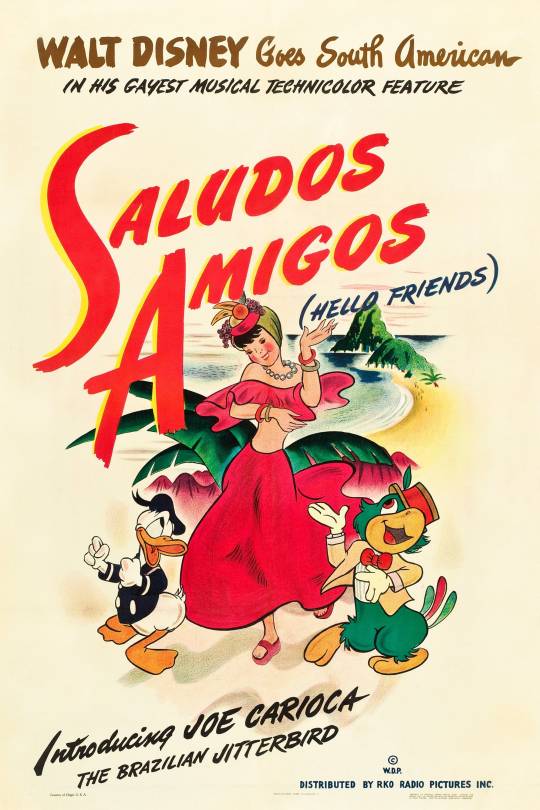
9.Melody Time -Its fine .I like the Blame it on the Samba segment and the Johnny Appleseed segment is sweet and definately the best part of the film,gets me misty eyed ,but every other segment is just.....OK to me
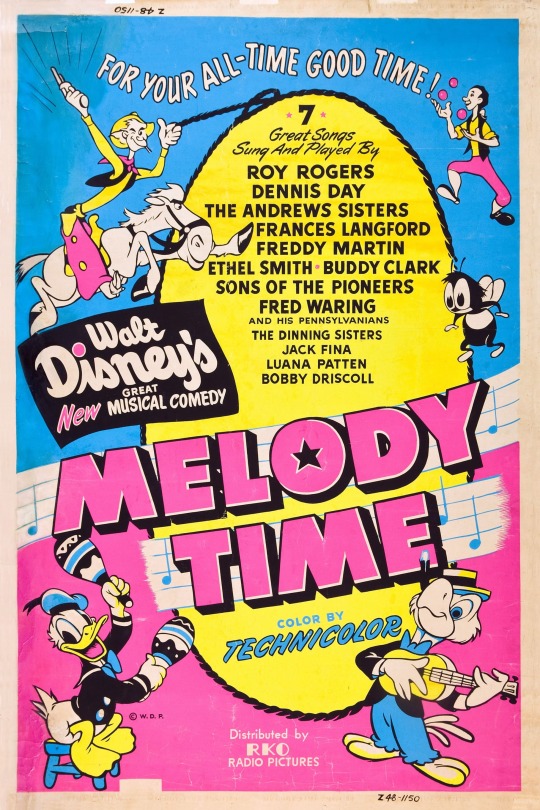
8.Three Caballeros -The much better companion film to Saludos Amigos,this film is weird and energetic ansd just fun,with the titular song being a highlight .

7.Dumbo:So of the 5 Capital C Classics(The first 5 films Disney made which are Snow White,Pinocchio,Fantasia ,Dumbo and Bambi ),I didnt know which ones would rank where.....But knew of the 5 Dumbo would be the lowest,which I feel bad about cuase...I really like Dumbo ,its a very nostalgic childhood favorite :Pink Elephants is a great sequence,the Baby Mine song brings a tear to my eye .heck the songs in general are good,Dumbo is a lovable protagonist and I love the performance of Edward Brophy as Timothy the mouse ,I think he is an underrated sidekick.It has a MAJOR problem with it and yes it is the racism ,like wow,not just the crow scene but the song "Happy Hearted Roustabouts" which is just...Yikes .However theres another reason it is not higher becuase it does its job too well.It was made to be a short simple movie,and it suceeds in being that ,but as such the other films I find more interesting .However let it be known I have a soft spot for Dumbo
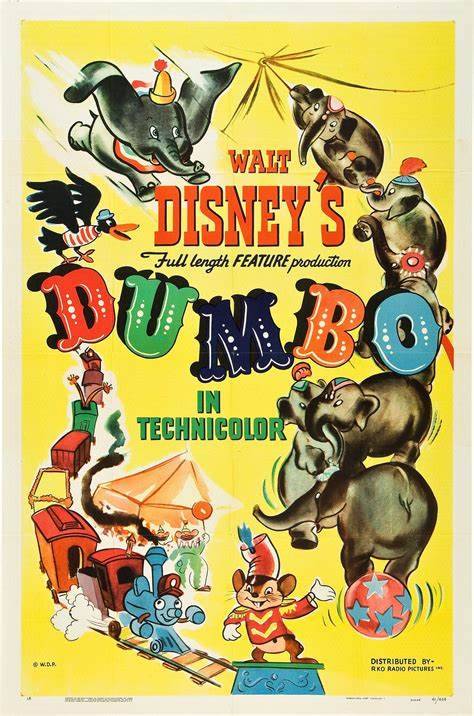
6.Make Mine Music -This ia an underrated gem.I personally dont dig the more abstract segments but theres a lot of fun music and animation and I think the final segment the Whale That Wanted To Sing at the Met is a masterpiece with for me,the saddest moment in the Walt era
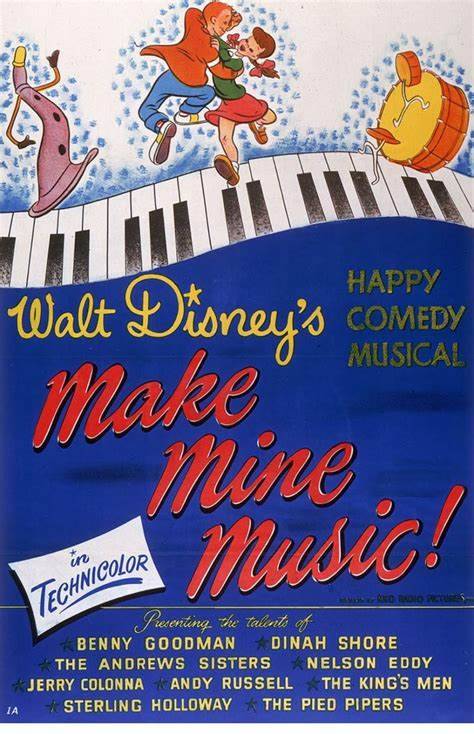
5.Fantasia -FAntasia is a movie I admire more then I like .Most of what I love is in the second half,I adore the Dance of the Hours and the Pastorial Sympathy and of course Night on Bald Mountain is MAGNIFICENT ,butwith the exception of the delightful Sorcerers Apprentice,the first half drags for me .I do like the movie ,finding it very artistically pleasing but I cant say its one of my personal favorite Disney films but can totally see why it is a favorite for many
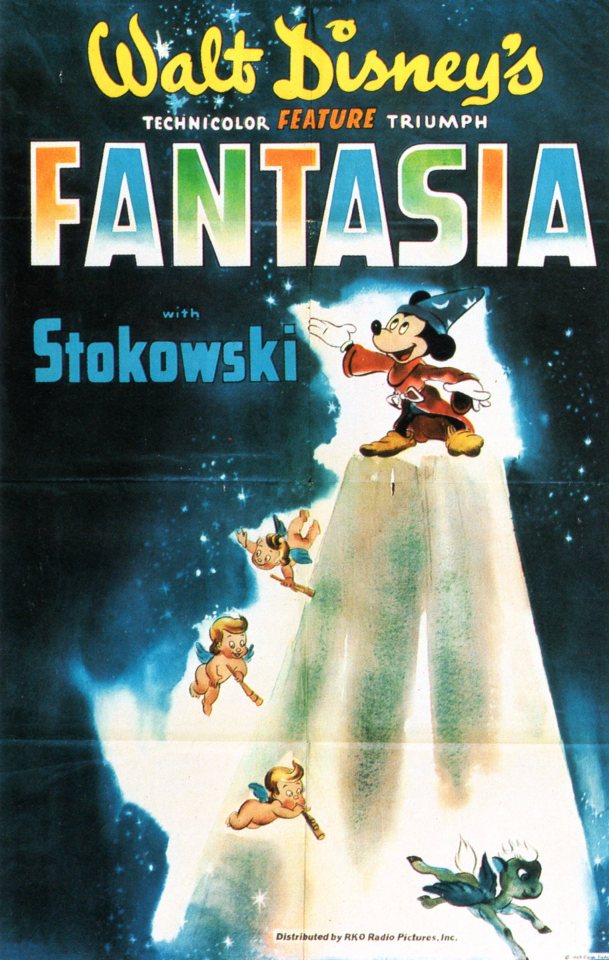
4.Bambi -This is a contender for the best looking film of the Walt era,gorgeous backgrounds ,great character animation and its more of a vibe then a story .Its not for everyone....But Bambi is awesome to me,its kind of neat just watching this deer live his life .ITs really cute (Especially the stuff with Thumper the rabbit ),its gorgeous and has some solid emotional moments .I dont like the soundtrack but the rest of the film I really enjoy .

3.The Adventures of Ichabod and Mr Toad -This is my favorite of the wartime/post war animated films cause its one I watched a bunch as a kid .No9w truthfully the first segment covering Wind In the Willows is just good.I like the performances of Eric Blore as Mr Toad and J PAt O Malley as Cyril ,theres some funny moments,Basil Rathbone is a good narrator ,but I prefer other takes on Wind in the Willows and I dont like how minimized Ratty and Mole are .....The second segment is a masterpiece,with great character animation,comedy,wonderful narration by Bing Crosby who also sings the banger that is the Headless Horseman song and yeah the Headless Horseman himself is a wonderfully scary villain with the chase scene between him and Ichabod Crane being one hell of a climax.

2.Snow White and the Seven Dwarfs -This film the more I see it the more I love it .Its funny cause I used to not like this movie but now I have fallen for its simplistic charm.It feels like no other Disney film ,like it is so unpolished cause they are trying to figure out how to make a feature and I finsd it endearing .Snow White is a character I do care about,the Queen is a simple yet imposing villain and By god when she becomes the Witch she is reallly creepy and rightfully has been nightmare fuel for many a child over the generations (Props to the voice work of Lucille LaVerne ).The scene stealers really are the Dwarfs ,especially Grumpy and Dopey who are played an animated well.Bit of a comfort movie for me ,so had to place it a bit high

1.Pinocchio-This is one of my favorite animated films of all time .It is sweet ,it is dramtic , and it can be really intense .The songs are all great (No Strings On Me might be my favorite ) .The character animation is great (I particularly love Bill Tytlas animation of Stromboli ) ,the climax is just a marvel of animation (Monstro the Whale is one hell of a feat of animation ),Pinocchio is a likeable protagonist,Honest John is a hilarious comedic villain who stands in contrast to the more terrifying villainay of Stromboli and the Coachman ,and Jiminy Cricket ,Geppetto,and Figaro are just lovable.I love lovve love love love love love this movie .
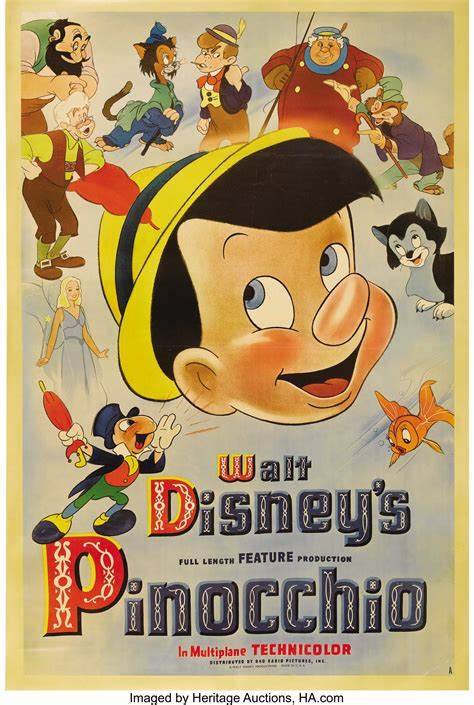
@ariel-seagull-wings @makingboneboy @amalthea9 @the-blue-fairie @theancientvaleofsoulmaking @themousefromfantasyland @filmcityworld1 @princesssarisa
9 notes
·
View notes
Text
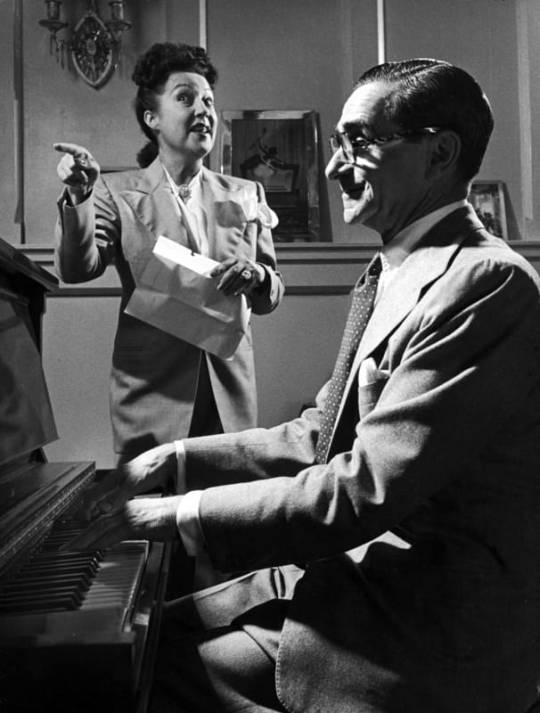
Merman and Berlin. Probably working on Call Me Madam.
Two American originals. [Don Stitt]
* * * *
There's no business like show business like no business I know
Everything about it is appealing, everything that traffic will allow
Nowhere could you get that happy feeling when you are stealing that extra bow
There's no people like show people, they smile when they are low
Even with a turkey that you know will fold, you may be stranded out in the cold
Still you wouldn't change it for a sack of gold, let's go on with the show
The butcher, the baker, the grocer, the clerk
Are secretly unhappy men because
The butcher, the baker, the grocer, the clerk
Get paid for what they do but no applause.
They'd gladly bid their dreary jobs goodbye for anything theatrical and why?
There's no business like show business and I tell you it's so
Traveling through the country is so thrilling, standing out in front on opening nights
Smiling as you watch the theater filling, and there's your billing out there in lights
There's no people like show people, they smile when they are low
Angels come from everywhere with lots of jack, and when you lose it, there's no attack
Where could you get money that you don't give back? Let's go on with the show
The cowboys, the wrestlers, the tumblers, the clowns
The roustabouts that move the show at dawn
The music, the spotlights, the people, the towns
Your baggage with the labels pasted on
The sawdust and the horses and the smell
The towel you've taken from the last hotel
The costumes, the scenery, the makeup, the props
The audience that lifts you when you're down
The headaches, the heartaches, the backaches, the flops
The sheriff who escorts you out of town
The opening when your heart beats like a drum
The closing when the customers won't come
(There's no business like show business like no business I know)
You get word before the show has started that your favorite uncle died at dawn
Top of that, your pa and ma have parted, you're broken-hearted, but you go on
(There's no people like show people, they smile when they are low)
Yesterday they told you you would not go far, that night you open and there you are
Next day on your dressing room they've hung a star, let's go on with the show!
[Irving Berlin]
#Ethel Merman#Irving Berlin#Don Stitt#music#songs#song lyrics#there's no business like show business
7 notes
·
View notes
Note
2, 13, 14 for the Octopath questions?
[Tumblr is doing format things and eating my list starters for sustenence, so this is placeholder so #2 doesn't show as #1.]
2. Favorite NPC?
Ori the Scrivener. I adore Ori for many, many plot and character reasons but also for her ability to use of "roustabout" in a sentence and make it sound cool.
Adding here that Jeannie Tirado did a great job of voicing her, too. People joke about the mic peaking but honestly I was so into the way she performed the role I didn't notice it in-game. Too busy squealing like a fool and then sobbing profusely.
13. Favorite soundtrack?
Empty Memories, as in a previous ask. It delivers on those haunting, mournful notes.
youtube
14. Which companion did you choose for Ochette?
Mahina the malamaowl, a very cool bird! Her dynamic with Ochette where neither is consistently the more "mature" one and both get distracted sometimes is very cute.
When given the option to choose owls over other more normal animal friends, I usually tend to lean towards hoot hoot supremacy.
(Frogs and otters can compete pretty strongly, granted.)
5 notes
·
View notes
Text
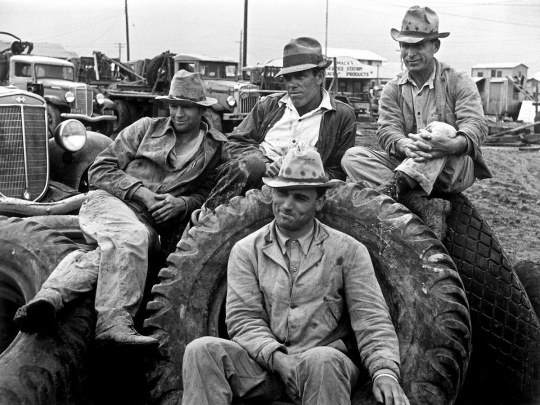
Roustabouts in Freer, Texas, take time off from their job, 1937
Photo: Carl Mydans
25 notes
·
View notes
Text
WIP Wednesday
@the-wip-project
I hoped to have this scene finished before posting it but it is WIP Wednesday, not Finished Project Wednesday.
This is a scene that won't make it into final. But I need to know how the incident happened. Here's the beginning:
Maury calls up Boxer as the audience volunteer. Sam agreed to a shill and the roustabouts all get a turn. Boxer’s one of the better ones; she changes up her lines each time and plays the wow-I’m-in-the-act part to the hilt.
I ought to be paying attention to Eva, but a scuffle in the crowd opposite draws my eye. A couple, or a pair at least, making a fuss over having to move. They’re not loud enough for me to hear. But they’re not happy, that’s certain. One of ‘em at least. The other seems a bit more conciliatory. Sora or Tom finally convince them but they’re definitely pissed. Pissed off and piss drunk, if the lurching is any indication. They end up at the edge of the audience, fuming.
Eva and Maury kept the patter up until they settled. I’ll have to hoof it to start on time. Boxer played along like nothing was wrong. She marks the bullets the way she’s supposed to and hands them back to Eva. Show time.
This part always makes me nervous. Even with the prop, the prop I rigged myself, that I literally checked not five minutes before, I worry something will go wrong. I watch the setup with intent. Even after all this time I still can’t see Eva palm the cartridges but I know she does. Maury’s providing distraction for the audience. Then he asks her to shoot the target board.
And she does.
The report is loud, loud as a real gunshot. Which it shouldn't be, but it is, and they insist they need to keep some illusions secret. She does a good job pretending the recoil. I’d be fooled if I hadn’t taught her how.
The crowd ooohs and ahhhhs at the hole in the board. Right through the heart shape in the human outline. Right where Maury’s heart will be when they’re doing it for real.
#wipwednesday#kmlaney fiction#kmlaney writes#mistlands#skyfallen#bad luck phil#Maury palladino#Eva Palladino
3 notes
·
View notes
Text
Basic safety Training Roustabout Course Anchor Handling
Proficiency in FRC / FRB (Fast Rescue Craft / Boat ) Course COXSWAIN & BOATMAN
Ocean Offshore Marine India
Purpose
Fast Rescue Craft / Boat course is designed as per IMO guidelines. It is to train personnel to operate FRC/FRB, which is mandatory for deployment in offshore field as per IOGP and on RO-RO passenger vessels as per IMO.
Rig Contingency Plans will describe the actions, relevant for the type of vessel and equipment used, to take in the event of a calamity on board a vessel. One of the topics covered is the emergency procedure/ plan of rescue and treatment of casualties, including the use of FRB’s.
The emergency procedure will describe initial actions to take by the Master, FRB coxswain and crew before, during and after launching a FRB. Another topic will be the rescue, treatment of and transfer to safety of casualties after recovery. Crew needs to be trained accordingly and the procedure/plan will be revised when there are changes in legislation or best practices.
Target Audience Fast Rescue Craft
Marine crew working in offshore fields and those taking up jobs on RO-RO passenger ferry.
This course is essential for personnel who are new to the offshore oil and gas industry that require this safety and emergency response training and assessment to work in an offshore cold or warm water environment.
Ocean Offshore Marine India uses the latest equipments. We are the best institute to offer the #offshore courses in India. We offer all types of courses related to the offshore Industry.
Contact for the offshore course booking of #BOSIET, #HUET #FOET, H2S #HLO #FRC #PSCRB, HFF, #HDFF #STCW 2010 Etc. #Now In India. Email- Oceanoffshore@pacific-ocean. com weoffshore@gmail. com Mob-8750141747

0 notes
Text

𝐑𝐨𝐮𝐬𝐭𝐚𝐛𝐨𝐮𝐭 𝐉𝐨𝐛𝐬:
As a roustabout, you'll: clean and look after the drilling deck and equipment. prepare drilling equipment for others to use. check pipes for leaks and report them.
Apply to Latest Job Openings of Roustabout: http://surl.li/rhsop
0 notes
Text

"You grew up like this?" for Clint. he has the Vibes of a ChildhoodTM but i actually have no idea. here's tk though
“Yeah, sort of.” A shrug, hands tucked into his pockets, as he wandered around the carnival with TK. Clint wasn’t having the greatest of days—there was noise coming from every direction, all at once, and that tended to be A Lot. It was all sort of blurring together and he had a hard time picking out individual sounds. TK’s voice was doing it’s best to blend in with the rest of it; it took all of Clint’s concentration to focus on it.
This was nice though, he thought, talking about a time in his life that he actually looked back on fondly.
“When I was a kid, me and my brother ran away from one of our foster homes. Joined a travelling circus.” A small smile played at his lips. “There’s no freeloading with carnies, though—you gotta earn your keep. So, we worked as roustabouts, doing stuff like putting up and tearing down tents, taking care of the grounds, working with the animals…all sorts of odd jobs, too. Any kind of grunt work, that’s what me and Barney did.”
Glancing off to his left, he watched as a kid tried to win one of the rigged games. Clint knew this one, knew how to win it, how to actually get the balloons to pop. Without really meaning to, he found himself wandering closer, still talking to TK as he did. “That all sort of stopped for me once the Swordsman and Trick Shot started training me, though. Spent most of my time practicing, then.”
@parameddic (x)
#parameddic#✦ ic: clint barton#✦ verse: main (clint barton)#✦ meme reply: clint barton#Clint has definitely had A ChildhoodTM#his dad was an abusive drunk who is literally the reason he's deaf#he grew up with carnies#was betrayed by the Swordsman and abandoned by Barney and Trick Shot#he's had A Time#i could have gotten sad about it but Clint wanted to share something happy#he is also 100% going to go win that game for that kid#✦ queued
1 note
·
View note
Text
Exploring Lucrative Opportunities: Drilling Jobs
Are you looking for a dynamic career that promises adventure, substantial rewards, and the chance to be part of critical industries? If so, drilling jobs might just be the perfect fit for you! In this blog post, we'll dive deep into the world of drilling careers, uncovering the diverse opportunities, prerequisites, and the incredible potential for growth in this exciting field.
Understanding Drilling Jobs
What are drilling jobs? At its core, drilling involves creating holes in the ground to access valuable resources like oil, natural gas, water, minerals, and geothermal energy. Drilling jobs encompass a range of roles across various industries, each with its unique challenges and rewards.

The Main Types of Drilling Jobs
Oil and Gas Drilling: This sector is perhaps the most well-known and significant. Oil and gas drilling professionals work tirelessly to extract fossil fuels from beneath the Earth's surface, supplying the world's energy needs.
Geothermal Drilling: As the world shifts towards sustainable energy, geothermal drilling has gained traction. Geothermal drilling involves tapping into the Earth's natural heat to produce electricity and heat buildings.
Mining Exploration: Mining drilling jobs are crucial for locating and extracting valuable minerals, metals, and ores that power various industries worldwide.
Water Well Drilling: Water well drilling plays a pivotal role in ensuring access to clean and safe water for communities and industries alike.
The Appeal of Drilling Jobs
1. Adventure Awaits: Drilling jobs often take professionals to remote and exotic locations, from offshore drilling platforms to lush rainforests or arid deserts. If you're seeking an adventurous career that breaks the monotony of a traditional office job, drilling jobs won't disappoint.
2. High Earning Potential: One of the most enticing aspects of drilling careers is their potential for handsome rewards. Whether you're a seasoned driller, an engineer, or a technician, the demand for skilled personnel ensures competitive compensation packages.
3. Skill Development and Growth: Drilling jobs offer a continuous learning curve. Aspiring professionals can enter the field with minimal qualifications and climb the ladder through on-the-job experience, certifications, and specialized training.
4. Contributing to Vital Industries: Drilling professionals play a crucial role in powering the world and driving essential industries. Whether it's fueling transportation or providing resources for manufacturing, the work done by drilling experts is indispensable.
Getting Started: Qualifications and Skills
1. Educational Requirements: While some entry-level drilling jobs may only require a high school diploma or GED equivalent, obtaining a relevant degree or certification can significantly enhance your prospects. Degrees in geology, petroleum engineering, or environmental science are valuable assets in the field.
2. Technical Skills: Drilling jobs often involve operating complex machinery and equipment. Familiarity with drilling rigs, surveying tools, and safety protocols is essential. Enrolling in technical courses or apprenticeships can help you gain these vital skills.
3. Physical Endurance: It's no secret that drilling jobs can be physically demanding. Being in good physical shape and having the stamina to work long hours in challenging conditions will work in your favor.
4. Problem-Solving Abilities: Drilling sites present unique challenges, and problem-solving skills are crucial. Quick thinking and adaptability can make all the difference when unexpected situations arise.
Navigating Your Career Path
1. Entry-Level Positions: Getting started in the drilling industry may mean beginning as a roustabout or roughneck. These roles are physically intensive but offer valuable insights into the drilling process.
2. Specialization and Advancement: As you gain experience, consider specializing in a particular area such as directional drilling, drilling fluids management, or well testing. Specializations can lead to higher-paying positions and increased responsibility.
3. Networking and Professional Associations: Joining industry-related associations and attending networking events can help you connect with seasoned professionals, potential mentors, and even open up job opportunities.
Safety First
Safety is paramount in drilling jobs. From using personal protective equipment (PPE) to following strict safety protocols, prioritizing your well-being and that of your team is non-negotiable.
Conclusion
If you seek a career that combines excitement, lucrative prospects, and the opportunity to contribute to vital industries, drilling jobs are the perfect choice. With various paths for entry, incredible growth potential, and the chance to explore different sectors, a drilling career can be both rewarding and fulfilling. So, gear up, prepare yourself for an extraordinary journey, and embrace the world of drilling jobs!
0 notes
Text
The Moral Crisis of America’s Doctors
Some years ago, a psychiatrist named Wendy Dean read an article about a physician who died by suicide. Such deaths were distressingly common, she discovered. The suicide rate among doctors appeared to be even higher than the rate among active military members, a notion that startled Dean, who was then working as an administrator at a U.S. Army medical research center in Maryland. Dean started asking the physicians she knew how they felt about their jobs, and many of them confided that they were struggling. Some complained that they didn’t have enough time to talk to their patients because they were too busy filling out electronic medical records. Others bemoaned having to fight with insurers about whether a person with a serious illness would be preapproved for medication. The doctors Dean surveyed were deeply committed to the medical profession. But many of them were frustrated and unhappy, she sensed, not because they were burned out from working too hard but because the health care system made it so difficult to care for their patients.
In July 2018, Dean published an essay with Simon G. Talbot, a plastic and reconstructive surgeon, that argued that many physicians were suffering from a condition known as moral injury. Military psychiatrists use the term to describe an emotional wound sustained when, in the course of fulfilling their duties, soldiers witnessed or committed acts — raiding a home, killing a noncombatant — that transgressed their core values. Doctors on the front lines of America’s profit-driven health care system were also susceptible to such wounds, Dean and Talbot submitted, as the demands of administrators, hospital executives and insurers forced them to stray from the ethical principles that were supposed to govern their profession. The pull of these forces left many doctors anguished and distraught, caught between the Hippocratic oath and “the realities of making a profit from people at their sickest and most vulnerable.”
The article was published on Stat, a medical-news website with a modest readership. To Dean’s surprise, it quickly went viral. Doctors and nurses started reaching out to Dean to tell her how much the article spoke to them. “It went everywhere,” Dean told me when I visited her last March in Carlisle, Pa., where she now lives. By the time we met, the distress among medical professionals had reached alarming levels: One survey found that nearly one in five health care workers had quit their job since the start of the pandemic and that an additional 31 percent had considered leaving. Professional organizations like National Nurses United, the largest group of registered nurses in the country, had begun referring to “moral injury” and “moral distress” in pamphlets and news releases. Mona Masood, a psychiatrist who established a support line for doctors shortly after the pandemic began, recalls being struck by how clinicians reacted when she mentioned the term. “I remember all these physicians were like, Wow, that is what I was looking for,” she says. “This is it.”
Dean’s essay caught my eye, too, because I spent much of the previous few years reporting on moral injury, interviewing workers in menial occupations whose jobs were ethically compromising. I spoke to prison guards who patrolled the wards of violent penitentiaries, undocumented immigrants who toiled on the “kill floors” of industrial slaughterhouses and roustabouts who worked on offshore rigs in the fossil-fuel industry. Many of these workers were hesitant to talk or be identified, knowing how easily they could be replaced by someone else. Compared with them, physicians were privileged, earning six-figure salaries and doing prestigious jobs that spared them from the drudgery endured by so many other members of the labor force, including nurses and custodial workers in the health care industry. But in recent years, despite the esteem associated with their profession, many physicians have found themselves subjected to practices more commonly associated with manual laborers in auto plants and Amazon warehouses, like having their productivity tracked on an hourly basis and being pressured by management to work faster.
Because doctors are highly skilled professionals who are not so easy to replace, I assumed that they would not be as reluctant to discuss the distressing conditions at their jobs as the low-wage workers I’d interviewed. But the physicians I contacted were afraid to talk openly. “I have since reconsidered this and do not feel this is something I can do right now,” one doctor wrote to me. Another texted, “Will need to be anon.” Some sources I tried to reach had signed nondisclosure agreements that prohibited them from speaking to the media without permission. Others worried they could be disciplined or fired if they angered their employers, a concern that seems particularly well founded in the growing swath of the health care system that has been taken over by private-equity firms. In March 2020, an emergency-room doctor named Ming Lin was removed from the rotation at his hospital after airing concerns about its Covid-19 safety protocols. Lin worked at St. Joseph Medical Center, in Bellingham, Wash. — but his actual employer was TeamHealth, a company owned by the Blackstone Group.
E.R. doctors have found themselves at the forefront of these trends as more and more hospitals have outsourced the staffing in emergency departments in order to cut costs. A 2013 study by Robert McNamara, the chairman of the emergency-medicine department at Temple University in Philadelphia, found that 62 percent of emergency physicians in the United States could be fired without due process. Nearly 20 percent of the 389 E.R. doctors surveyed said they had been threatened for raising quality-of-care concerns, and pressured to make decisions based on financial considerations that could be detrimental to the people in their care, like being pushed to discharge Medicare and Medicaid patients or being encouraged to order more testing than necessary. In another study, more than 70 percent of emergency physicians agreed that the corporatization of their field has had a negative or strongly negative impact on the quality of care and on their own job satisfaction.
There are, of course, plenty of doctors who like what they do and feel no need to speak out. Clinicians in high-paying specialties like orthopedics and plastic surgery “are doing just fine, thank you,” one physician I know joked. But more and more doctors are coming to believe that the pandemic merely worsened the strain on a health care system that was already failing because it prioritizes profits over patient care. They are noticing how the emphasis on the bottom line routinely puts them in moral binds, and young doctors in particular are contemplating how to resist. Some are mulling whether the sacrifices — and compromises — are even worth it. “I think a lot of doctors are feeling like something is troubling them, something deep in their core that they committed themselves to,” Dean says. She notes that the term moral injury was originally coined by the psychiatrist Jonathan Shay to describe the wound that forms when a person’s sense of what is right is betrayed by leaders in high-stakes situations. “Not only are clinicians feeling betrayed by their leadership,” she says, “but when they allow these barriers to get in the way, they are part of the betrayal. They’re the instruments of betrayal.”
Not long ago, I spoke to an emergency physician, whom I’ll call A., about her experience. (She did not want her name used, explaining that she knew several doctors who had been fired for voicing concerns about unsatisfactory working conditions or patient-safety issues.) A soft-spoken woman with a gentle manner, A. referred to the emergency room as a “sacred space,” a place she loved working because of the profound impact she could have on patients’ lives, even those who weren’t going to pull through. During her training, a patient with a terminal condition somberly informed her that his daughter couldn’t make it to the hospital to be with him in his final hours. A. promised the patient that he wouldn’t die alone and then held his hand until he passed away. Interactions like that one would not be possible today, she told me, because of the new emphasis on speed, efficiency and relative value units (R.V.U.), a metric used to measure physician reimbursement that some feel rewards doctors for doing tests and procedures and discourages them from spending too much time on less remunerative functions, like listening and talking to patients. “It’s all about R.V.U.s and going faster,” she said of the ethos that permeated the practice where she’d been working. “Your door-to-doctor time, your room-to-doctor time, your time from initial evaluation to discharge.”
Appeasing her peers and superiors without breaching her values became increasingly difficult for A. On one occasion, a frail, elderly woman came into the E.R. because she was unable to walk on her own. A nurse case manager determined that the woman should be discharged because she didn’t have a specific diagnosis to explain her condition and Medicare wouldn’t cover her stay, even though she lived alone and couldn’t get out of a chair to eat or go to the bathroom. A. cried with the woman and tried to comfort her. Then she pleaded with the hospitalist on duty to admit her. A.’s appeal was successful, but afterward, she wondered, What are we being asked to do? When we spoke, A. had taken a leave from work and was unsure if she would ever go back, because of how depleted she felt. “It’s all about the almighty dollar and all about productivity,” she said, “which is obviously not why most of us sign up to do the job.”
That’s not always clear to patients, many of whom naturally assume that their doctors are the ones who decide how much time to spend with them and what to charge them for care. “Doctors are increasingly the scapegoats of systemic problems within the health care system,” Masood says, “because the patient is not seeing the insurance company that denied them the procedure, they’re not seeing the electronic medical records that are taking up all of our time. They’re just seeing the doctor who can only spend 10 minutes with them in the room, or the doctor who says, ‘I can’t get you this medication, because it costs $500 a month.’ And what ends up happening is we internalize that feeling.”
I spoke to a rheumatologist named Diana Girnita, who found this cycle deeply distressing. Originally from Romania, Girnita came to the United States to do a postdoc at Harvard and was dazzled by the quality of the training she received. Then she began practicing and hearing patients complain about the exorbitant bills they were sent for routine labs and medications. One patient came to her in tears after being billed $7,000 for an IV infusion, for which the patient held her responsible. “They have to blame someone, and we are the interface of the system,” she said. “They think we are the greedy ones.” Fed up, Girnita eventually left the practice.
Some doctors acknowledged that the pressures of the system had occasionally led them to betray the oaths they took to their patients. Among the physicians I spoke to about this, a 45-year-old critical-care specialist named Keith Corl stood out. Raised in a working-class town in upstate New York, Corl was an idealist who quit a lucrative job in finance in his early 20s because he wanted to do something that would benefit people. During medical school, he felt inspired watching doctors in the E.R. and I.C.U. stretch themselves to the breaking point to treat whoever happened to pass through the doors on a given night. “I want to do that,” he decided instantly. And he did, spending nearly two decades working long shifts as an emergency physician in an array of hospitals, in cities from Providence to Las Vegas to Sacramento, where he now lives. Like many E.R. physicians, Corl viewed his job as a calling. But over time, his idealism gave way to disillusionment, as he struggled to provide patients with the type of care he’d been trained to deliver. “Every day, you deal with somebody who couldn’t get some test or some treatment they needed because they didn’t have insurance,” he said. “Every day, you’re reminded how savage the system is.”
Corl was particularly haunted by something that happened in his late 30s, when he was working in the emergency room of a hospital in Pawtucket, R.I. It was a frigid winter night, so cold you could see your breath. The hospital was busy. When Corl arrived for his shift, all of the facility’s E.R. beds were filled. Corl was especially concerned about an elderly woman with pneumonia who he feared might be slipping into sepsis, an extreme, potentially fatal immune response to infection. As Corl was monitoring her, a call came in from an ambulance, informing the E.R. staff that another patient would soon be arriving, a woman with severe mental health problems. The patient was familiar to Corl — she was a frequent presence in the emergency room. He knew that she had bipolar disorder. He also knew that she could be a handful. On a previous visit to the hospital, she detached the bed rails on her stretcher and fell to the floor, injuring a nurse.
In a hospital that was adequately staffed, managing such a situation while keeping tabs on all the other patients might not have been a problem. But Corl was the sole doctor in the emergency room that night; he understood this to be in part a result of cost-cutting measures (the hospital has since closed). After the ambulance arrived, he and a nurse began talking with the incoming patient to gauge whether she was suicidal. They determined she was not. But she was combative, arguing with the nurse in an increasingly aggressive tone. As the argument grew more heated, Corl began to fear that if he and the nurse focused too much of their attention on her, other patients would suffer needlessly and that the woman at risk of septic shock might die.
Corl decided he could not let that happen. Exchanging glances, he and the nurse unplugged the patient from the monitor, wheeled her stretcher down the hall, and pushed it out of the hospital. The blast of cold air when the door swung open caused Corl to shudder. A nurse called the police to come pick the patient up. (It turned out that she had an outstanding warrant and was arrested.) Later, after he returned to the E.R., Corl could not stop thinking about what he’d done, imagining how the medical-school version of himself would have judged his conduct. “He would have been horrified.”
Concerns about the corporate takeover of America’s medical system are hardly new. More than half a century ago, the writers Barbara and John Ehrenreich assailed the power of pharmaceutical companies and other large corporations in what they termed the “medical-industrial complex,” which, as the phrase suggests, was anything but a charitable enterprise. In the decades that followed, the official bodies of the medical profession seemed untroubled by this. To the contrary, the American Medical Association consistently opposed efforts to broaden access to health care after World War II, undertaking aggressive lobbying campaigns against proposals for a single-payer public system, which it saw as a threat to physicians’ autonomy.
But as the sociologist Paul Starr noted in “The Social Transformation of American Medicine,” physicians earned the public’s trust and derived much of their authority because they were perceived to be “above the market and pure commercialism.” And in fields like emergency medicine, an ethos of service and self-sacrifice prevailed. At academic training programs, Robert McNamara told me, students were taught that the needs of patients should always come first, and that doctors should never allow financial interests to interfere with how they did their jobs. Many of these programs were based in inner-city hospitals whose emergency rooms were often filled with indigent patients. Caring for people regardless of their financial means was both a legal obligation — codified in the Emergency Medical Treatment and Labor Act, a federal law passed in 1986 — and, in programs like the one McNamara ran at Temple, a point of pride. But he acknowledged that over time, these values increasingly clashed with the reality that residents encountered once they entered the work force. “We’re training people to put the patient first,” he says, “and they’re running into a buzz saw.”
Throughout the medical system, the insistence on revenue and profits has accelerated. This can be seen in the shuttering of pediatric units at many hospitals and regional medical centers, in part because treating children is less lucrative than treating adults, who order more elective surgeries and are less likely to be on Medicaid. It can be seen in emergency rooms that were understaffed because of budgetary constraints long before the pandemic began. And it can be seen in the push by multibillion-dollar companies like CVS and Walmart to buy or invest in primary-care practices, a rapidly consolidating field attractive to investors because many of the patients who seek such care are enrolled in the Medicare Advantage program, which pays out $400 billion to insurers annually. Over the past decade, meanwhile, private-equity investment in the health care industry has surged, a wave of acquisitions that has swept up physician practices, hospitals, outpatient clinics, home health agencies. McNamara estimates that the staffing in 30 percent of all emergency rooms is now overseen by private-equity-owned firms. Once in charge, these companies “start squeezing the doctors to see more patients per hour, cutting staff,” he says.
As the focus on revenue and the adoption of business metrics has grown more pervasive, young people embarking on careers in medicine are beginning to wonder if they are the beneficiaries of capitalism or just another exploited class. In 2021, the average medical student graduated with more than $200,000 in debt. In the past, one privilege conferred on physicians who made these sacrifices was the freedom to control their working conditions in independent practices. But today, 70 percent of doctors work as salaried employees of large hospital systems or corporate entities, taking orders from administrators and executives who do not always share their values or priorities.
Philip Sossenheimer, a 30-year-old medical resident at Stanford, told me that these changes had begun to precipitate a shift in self-perception among doctors. In the past, physicians “didn’t really see themselves as laborers,” he notes. “They viewed themselves as business owners or scientists, as a class above working people.” Sossenheimer feels that it is different for his generation, because younger doctors realize that they will have far less control over their working conditions than their elders did — that the prestige of their profession won’t spare them from the degradation experienced by workers in other sectors of the economy. “For our generation, millennials and below, our feeling is that there is a big power imbalance between employers and workers,” he says.
Last May, the medical residents at Stanford voted to form a union by a tally of 835 to 214, a campaign Sossenheimer enthusiastically supported. “We’ve seen a boom in unionization in many other industries,” he told me, “and we realize it can level the power dynamics, not just for other workers but within medicine.” One thing that drove this home to him was seeing the nurses at Stanford, who belong to a union, go on strike to advocate for safer staffing and better working conditions. Their outspokenness stood in striking contrast to the silence of residents, who risked being singled out and disciplined if they dared to say anything that might attract the notice of the administration or their superiors. “That’s a big reason that unionization is so important,” he says.
The Stanford example has inspired medical residents elsewhere. Not long ago, I spoke with a group of residents in New York City who were thinking about unionizing, on the condition that I not disclose their identities or institutional affiliations. Although the medical profession has been slow to diversify, the residents came from strikingly varied backgrounds. Few grew up in wealthy families, judging by the number of hands that went up when I asked if they’d taken on debt to finish medical school. “Anyone here not take on debt?” said a woman sitting on the carpet in the living room where we gathered, prompting several people to laugh.
Having a union, one resident explained, would enable the group to demand better working conditions without having to worry about getting in trouble with their superiors or losing fellowship opportunities. They would be able to advocate for patients rather than apologizing to them for practices they considered shameful, another added. When I asked what they meant by shameful, I learned that a number of the residents had trained at a hospital that served an extremely poor community with a limited number of I.C.U. beds — beds that during the pandemic were sometimes given to wealthy “V.I.P.” patients from other states while sicker patients from the surrounding neighborhood languished on the general floor.
Forming unions is just one way that patient advocates are finding to push back against such inequities. Critics of private equity’s growing role in the health care system are also closely watching a California lawsuit that could have a major impact. In December 2021, the American Academy of Emergency Medicine Physician Group (A.A.E.M.P.G.), part of an association of doctors, residents and medical students, filed a lawsuit accusing Envision Healthcare, a private-equity-backed provider, of violating a California statute that prohibits nonmedical corporations from controlling the delivery of health services. Private-equity firms often circumvent these restrictions by transferring ownership, on paper, to doctors, even as the companies retain control over everything, including the terms of the physicians’ employment and the rates that patients are charged for care, according to the lawsuit. A.A.E.M.P.G.’s aim in bringing the suit is not to punish one company but rather to prohibit such arrangements altogether. “We’re not asking them to pay money, and we will not accept being paid to drop the case,” David Millstein, a lawyer for the A.A.E.M.P.G. has said of the suit. “We are simply asking the court to ban this practice model.” In May 2022, a judge rejected Envision’s motion to dismiss the case, raising hopes that such a ban may take effect.
Until the system changes, some doctors are finding ways to opt out. I spoke to several physicians who have started direct-care practices, in which patients pay a modest monthly fee to see doctors who can offer them more personalized out-of-network care, without having to answer to administrators or insurers. Diana Girnita, the rheumatologist who became disillusioned by the astronomical bills her patients kept receiving, started a direct-care practice in her specialty in 2020. One afternoon not long ago, I sat in on a virtual appointment she had with a patient who wished to remain anonymous, a 32-year-old veteran with an athletic build who began to experience severe joint pain several months earlier. He asked his primary-care physician for a referral to see a rheumatologist after a blood test showed a high level of antinuclear antibodies (ANAs), which can be a sign of an autoimmune disorder. He called every doctor’s office he could find within a 100-mile radius of his house, but none could schedule him for months. His wife then stumbled upon Girnita’s name online and called her office, and he got a virtual appointment the next day.
The meeting I sat in on was a follow-up appointment. When it began, Girnita relayed some good news, telling him that his ANA level had fallen and that his lab results indicated he did not have an autoimmune disease. The patient was visibly relieved, though he was still experiencing persistent pain in his wrist. Girnita advised him to get an MRI, which she said she could order for $800 — a fraction of the amount that hospitals typically charged. One advantage of the direct-care model was that physicians negotiated with labs and imaging centers for tests and services, Girnita told me, bypassing the corporate middlemen (insurers, pharmacy-benefit managers) that drove up health care costs.
When he went to medical appointments in the past, Girnita’s patient told me later, the doctors he saw were often brusque. “They come in, tell you the medicine you’re going to take and that’s it,” he said. His first appointment with Girnita lasted an hour, the minimum amount of time she allotted to all patients in their initial consultations. During the follow-up appointment I observed, Girnita spent half an hour answering his questions; she never cut him off and did not seem rushed or harried. At the end of the appointment, he thanked her profusely, in a way that made it clear he was not accustomed to such treatment. It was a novel experience not only for the patient but also for Girnita, who told me that, in the past, she often had to squeeze appointments into seven-minute time slots. Before starting her direct specialty-care practice, she added, she spent so many hours doing bureaucratic work that she barely had time to see her family, much less her patients. “The direct-care model is designed to rebuild trust,” she said, “and to re-establish a normal relationship between physicians and patients.”
Of course, the model is far from a panacea: Many doctors struggle to attract enough patients to make a living, which is a problem for specialists like Girnita, who rely on referrals from primary-care doctors. Girnita told me she understood why some doctors were choosing to leave the profession altogether. Two physicians she knew had switched careers recently, an impulse she fears will overcome more and more of her peers in the years to come, especially those who chose to become doctors for altruistic reasons. “They didn’t quit because they don’t like medicine,” she said. “They were both wonderful physicians.”
And even running direct-care practices, doctors cannot fully escape the frustrations and injustices of the health care system. A few months earlier, Girnita told me, a patient came to her after having a severe allergic reaction to an ulcer medication that his insurer had switched him onto because it no longer covered the drug he’d been taking. Girnita told me she had called her patient’s insurer every week as his condition deteriorated. When she finally got through, she was told they needed 30 days to process the appeal. Girnita was livid. “They are literally putting this patient in danger — it is sick,” she said. “This is sick medical care.”
1 note
·
View note
Text
Oil and Gas training in Trivandrum| Capital ITS
The oil and gas industry creates trillions of dollars in a year from the money it makes from selling oil. The top companies in the industry are USA, Saudi Arabia, Russia, Canada, and China. India has the opportunity for Oil and Gas Industry jobs– there will be an exponential increase in demand for skilled candidates. There are a lot of Oil and Gas Industry opportunities in this sector and over the next few years the demand for skilled candidates will grow exponentially. India will expand further in this sector by undertaking new projects under government and private corporations in both Midstream and Downstream sections.
Oil and Gas Industry Opportunities are classified in 3 section :
Operational Jobs
Management and Engineering jobs in the Oil & Gas Industry.
Technical and Supervisory Job
Operational Jobs
Equipment Operators: Operators operate the equipment operating in compliance with guidelines and safety standards.
Rig Operator: One who uses power construction equipment, like pumps, compressors, hoists, shovels, cranes etc. that excavate the earth and transport it, build steel for structural reinforcement, and pour concrete or other types of materials.
Floor Hands: One who performs the cleaning and maintenance of the floor of the drill as well as the entire drill equipment.
Derrick Hand: Someone who supervises and manages the entire procedure for the day-to-day operations of the rig for servicing.
Drivers: The job of a driver within a rig is to move equipment, materials, and tools from one location to the next.
Pipeline Technician: The job of a Pipeline Technicians’ is to provide technical, operational mechanical, electrical, and assistance for all equipment in the facility, which includes pipelines and pump stations/storage areas.
Oilfield Service Operator: The job that The Oilfield service manager is to set up, commission, and troubleshoot the automated operation of the equipment AC as well DC drives including other supporting equipment.
Roustabout: A roustabout performs various roles to play in support of the rig. It involves offloading of personnel and cargo vessels. A Roustabout also handles drilling pipe, casing tubing, and cutting work inside the rig.
Terminal Operator: A role that the Terminal Operator has is to conduct regular maintenance on the terminal as well as make sure that high quality as well as quantity of high-end products.
Mechanic: They are the person in charge of the maintenance and repair of the pumping station as well as terminal equipment, which include natural gasoline-fired engines, diesel-fired machines motors, motors, centrifugal as well as displacement pumps, gravity meters, pumps, compressors transmitters, as well as other devices.
Management and Engineering jobs in the Oil & Gas Industry.
Engineering and Project Management: The principal task of Project Managers is to begin the design, planning, manufacturing, and delivery of the product by managing and directing each project.
All Engineering Disciplines: The Engineer’s task is to pinpoint the issues associated with facet operations, look at alternatives, determine the most effective solution, and create the complete design of the process to allow for modifications or additions.
Well Site Managers: Well Site Managers are accountable for leading the crew at an oil and gas site. The job entails effectively and safely managing the operations at the site and overseeing field workers to meet business goals in full conformity to relevant guidelines, policies, and laws.
Logistics and Supply Chain: The role of a person in Logistics and Supply Chain typically involves gathering and analysing information, evaluating and making recommendations for routes and plans, as well as supporting logistics for exploration and production.
The Sales and Business Development Officer: The job of the business and sales officer is to ensure the number of orders that are placed for marketing and fuel by finding, creating, closing, and maintaining business relations with sales.
oil and gas training
Technical and Supervisory Job
All Field Service Disciplines: The charge for all operations and maintenance of compressed gas equipment and compressors within the area you live in.
Offshore Technicians: Offshore Technicians complete various maintenance such as repair and calibration to make improvements to the quality of the equipment within the area he is assigned.
ROV Supervisors and Technicians: The function of ROV Technicians is to oversee or take part in the operation and maintenance of sophisticated underwater search and rescue systems and their subsystems.
Saturation Technicians : The job of Saturation Technicians is to operate, repair, and maintain all dive saturation equipment utilized in diving operations underwater.
Forepersons & Line Supervisors: The job of a Foreman & Line Supervisor is to manage and organize teams, delegate work opportunities, and ensure that the right equipment is in place and available for completing a small-scale project.
Construction Superintendent: The job Construction Superintendent of the is to oversee projects that require the improvement and construction of petroleum retailing facilities.
Maintenance Technicians: Their function of this task is to diagnose repairs, maintenance, and testing of equipment that is facing problems with the crews operating on the field.
Control System Technicians: Their job is to set up, maintain and troubleshoot the operation of instruments, Control circuits, and other equipment that are associated with natural gas processes like the compression and dehydration processes, as well as the measurement, storage, and transmission of natural gas.
Electronics Technician: the job of Electronics Technicians is to ensure that all electronic issues are dealt with efficiently and effectively. They also need to oversee and supervise all electronic activities inside the equipment.
Instrumentation Technicians: The primary function in the position is to look over and test, modify, and repair electronic digital and Analog pneumatic, electronic mechanical, and other equipment and systems.
Maintenance Supervisor: The main responsibility for Maintenance Supervisors is security, efficiency, and environmental-friendly maintenance of refinery machinery.
HSE Manager: The purpose of the position is to lead and be accountable for business HSE goals, HSE-related programs, and HSE procedures for the site.
The Capital Institute of Technical Studies offers a great way for students to get their foot in the door of the oil and gas industry. Through its program, students can learn about various aspects of the industry, from refining and production to marketing and sales. In addition, they will also have the opportunity to network with professionals in the field, which can lead to internship and job opportunities down the road. If you are interested in pursuing a career in the oil and gas industry, the Capital Institute of Technical Studies is a great place to start.
0 notes